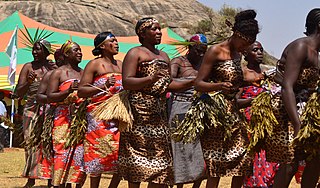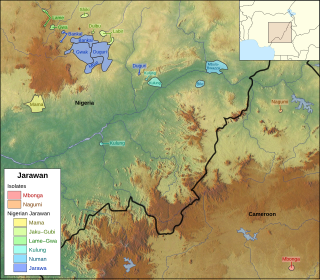| Language | Branch | Cluster | Dialects | Alternate spellings | Own name for language | Endonym(s) | Other names (location-based) | Other names for language | Exonym(s) | Speakers | Location(s) | Notes |
|---|
| Aja (extinct) | Zaar | North Bauchi | | Ajanci | | | | | | Extinct: formerly spoken at Kworko, Bauchi State | | no data |
| Das cluster | Zaar | Das | | | | | | | Ɓarawa | 8,830 (LA 1971) | Bauchi State, Toro and Dass LGAs | |
| Lukshi | Zaar | Das | | | Dәkshi | | | | | 1,130 (LA 1971) | | |
| Durr–Baraza | Zaar | Das | | | Bandas | | | | | 4,700 (LA 1971); 30–40,000 (Caron 2005) | Bauchi State, Das LGA, Durr and Baraza villages | |
| Zumbul | Zaar | Das | | Boodlә | | | | | Zumbulawa, Dumbulawa | See Wandi | Bauchi State, Das LGA, Zumbul town | |
| Wandi | Zaar | Das | | Wangday | | | | | | 700 (including Zumbul) (LA 1971) | Bauchi State, Das LGA, Wandi town | |
| Dot | Zaar | Das | | Dwat | Zoɗi | shérә́m zoɗi | Dott | | | 2,300 (LA 1971); a single large village. 37,582 (local census 2003). 7 wards (out of 11) speak Zoɗi | South of Bauchi on the Dass road | |
| Geji cluster | Zaar | Geji | | | | | Kayauri, Kaiyorawa | | Ɓarawa | | Bauchi State, Toro LGA | |
| Mәgang | Zaar | Geji | | Bolu, Buli | Mәg̣ àŋ | | | | | 1,250 (LA 1971), 'a few hundred' (Caron 2005) | | |
| Pyaalu | Zaar | Geji | | Pelu, Belu | Pyààlù | | | | | | | |
| Geji | Zaar | Geji | | | Gyaazә | | Bagba | | Gezawa, Gaejawa | 650 (LA 1971), 1000 (Caron 2005). 20 villages (2007) | Toro, Bauchi LGAs, Bauchi State | |
| Buu | Zaar | Geji | | Zaranda | Bùù | | | | | 750 (LA 1971), 'a few hundred' (Caron 2002) | | |
| Guus | Zaar | Guus | | | | | | Ɓarawa | Sayanci | 50,000 (1971 Schneeberg); 50,000 (1973 SIL) | Bauchi State, Tafawa Balewa LGA. West of Tafawa Balewa town. | |
| Guus | Zaar | Guus | | | mur gúús (one person); Gùùs (people) | vìì kә gúús (mouth of Guus) | Sigidi, Sugudi, Sigdi, Segiddi | | | 775 (1950 HDG). 17 villages (Caron 2002) | | |
| Polci cluster | Zaar | Polci | | | | | | | Ɓarawa, Palsawa | 6,150 or more (1971) | Bauchi State, Bauchi and Toro LGAs | |
| Zul | Zaar | Polci | Zul is mutually comprehensible with Mbaram | | Bi Zule | Nya Zule pl. Man Zule | | Mbarmi, Barma | Zulawa | 2,400 (LA 1971). 15 villages (2007) | Bauchi State, Bauchi and Toro LGAs | |
| Mbaram | Zaar | Polci | | Barang, Mbaram | | | | | | 250 CAPRO (1995a). One settlement only | Bauchi State, Bauchi LGA | |
| Dir | Zaar | Polci | | Diir | | | | | | 'a few hundred' (Caron 2005) | | |
| Buli | Zaar | Polci | | Bәlә | | | | | | 600 (LA 1971), 4000 (CAPRO 1995a), 'a few hundred' (Caron 2005) | | |
| Langas | Zaar | Polci | | | Nyamzax | | Lundur | | | 200 (LA 1971), 'a few hundred' (Caron 2005) | | |
| Luri | Zaar | Polci | | Lúr | | | | | | 30 (1973 SIL), 2 (Caron 2002) | Bauchi State, Bauchi LGA | |
| Polci | Zaar | Polci | | Posә, Polshi, Palci, Pәlci | | | | | | 2,950 (LA 1971); 70,000 (Caron 2005) | | |
| Zaar | Zaar | | Kal, Gambar Leere, Lusa | Zaʼr, Zar | Vìk Zaar, Vigzar | Zaar pl. Zàrsɛ̀ | | Sáyánci | Bàsáyè pl. Sáyáːwá, Saya, Seya, Seiyara [Saya terms are now considered derogatory] | 50,000 (1971 Schneeberg); 50,000 (1973 SIL) | Bauchi State, Tafawa Balewa LGA. West of Tafawa Balewa town. | |
| Zari cluster | Zaar | Zari | | | | | | | Ɓarawa | | Bauchi State, Toro and Tafawa Balewa LGAs; Plateau State, Jos LGA | |
| Zakshi | Zaar | Zari | | Zaksә | | | | | | 2,950 (1950 HDG) | | |
| Boto | Zaar | Zari | | Boot | | | | | Bibot | 1,000 (1950 HDG) | | |
| Zari | Zaar | Zari | | | | | Kopti, Kwapm | | | | | |
| Zeem-Caari-Danshe-Dyarim cluster | Zaar | Zeem-Caari-Danshe-Dyarim | | | | | | | Ɓarawa | | Bauchi State, Toro LGA | |
| Zeem (extinct) | Zaar | Zeem-Caari-Danshe-Dyarim | | | | | | | | Extinct (Caron 2005) | | |
| Tule (extinct) | Zaar | Zeem-Caari-Danshe-Dyarim | | | | | | | Tulai | Extinct (Caron 2005) | | |
| Danshe | Zaar | Zeem-Caari-Danshe-Dyarim | | | | | | | | Extinct (Caron 2005) | | |
| Chaari | Zaar | Zeem-Caari-Danshe-Dyarim | | | | | | | Tulai | a 'few hundred' speakers (Caron 2005) | | |
| Dyarim | Zaar | Zeem-Caari-Danshe-Dyarim | | | one person Mәn Dyarim, people Dyarim | Ndyarim Tә | Kaiwari | | | About 2000 ethnic Dyarim with about 100 fluent speakers (Blench 2005 est.) | Their main settlement is about 7 km south of Toro town in Toro LGA (N10˚ 02, E 9˚ 04). | |
| Lushi? | Zaar | Zeem-Caari-Danshe-Dyarim | | Lukshi | Dokshi | | | | | | | |
| Jimi | Zaar | | | | | | | | | 250 (LA 1971); 400 (1973 SIL) | Bauchi State, Darazo LGA | |
| Kir–Balar cluster | Boghom | Kir–Balar | | | | | | | | 360 (LA 1971) (Kir only) | Bauchi State, Bauchi LGA | no data |
| Kir | Boghom | Kir–Balar | | | | | | | | | | no data |
| Balar | Boghom | Kir–Balar | | | | | | | Larbawa | 50 CAPRO (1995a) | | no data |
| Boghom | Boghom | | | Burom, Burrum, Burma, Borrom, Boghorom, Bogghom, Bohom, Bokiyim | | | | | Burumawa | 9,500 (1952 W&B), 50,000 (1973 SIL) | Plateau State, Kanam LGA | |
| Mangas | Boghom | | | Maás | | | | | | 180 (LA 1971) | Bauchi State, Bauchi LGA | no data |
| Guruntum–Mbaaru | Guruntum | | By settlements Dookà, Gàr, Gayàr, Kàràkara, Kuukù, and Mbaarù | Gurutum | Gùrduŋ | | | | | 10,000 (1988 Jaggar) | Bauchi State, Bauchi and Alkaleri LGAs | |
| Ju | Guruntum | | | | | | | | | 150 (LA 1971) | Bauchi State, Bauchi LGA | |
| Tala | Guruntum | | | | | | | | | | Bauchi State, Bauchi LGA, Zungur district | |
| Zangwal | Guruntum | | | | | | | | | | Bauchi State, Bauchi LGA | no data |





